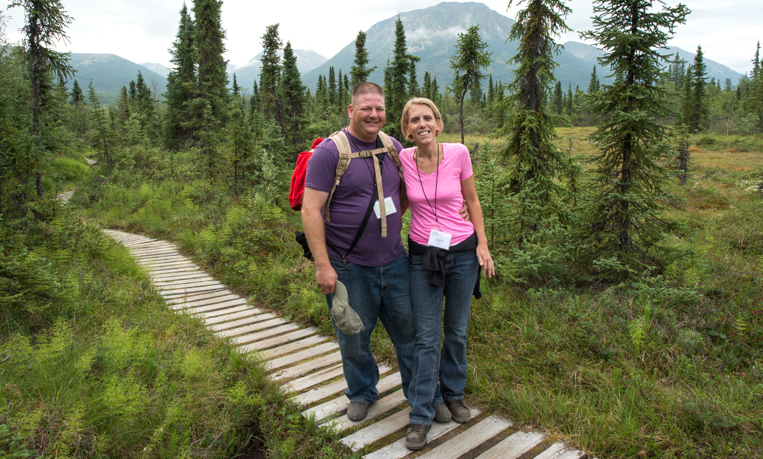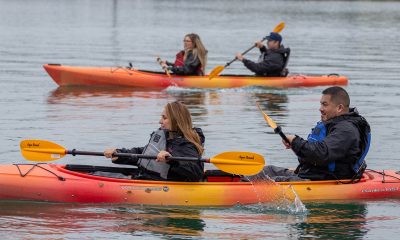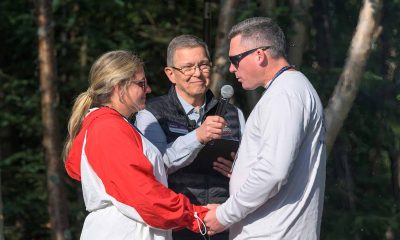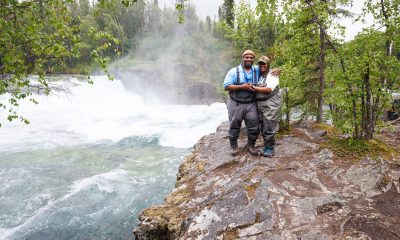After returning from battle, many people in the military find it difficult to assimilate into civilian life. Wounds, both physical and psychological, can make the process even more difficult. Operation Heal Our Patriots is making it easier.
By Randy Bishop, a Samaritan’s Purse staff writer who has traveled to Alaska to visit Operation Heal Our Patriots twice this summer
The men and women of our armed forces are trained to keenly focus on the mission before them. Physically, they must be models of strength. Mentally, they must be hyper-vigilant because their lives and the lives of their fellow warriors depend on it. They are always learning, always ready for a new challenge.
Yet what happens when they return home from combat with life-altering injuries? When their vision for years of military service vanishes into thin air? When they are medically retired in their 20s? When, even in everyday situations, their minds and bodies no longer serve them but instead betray them?
In many cases, the fallout from serious combat injuries—whether physical or psychological— follows a predictable pattern. A period of disheartening disorientation and depression sets in, characterized by withdrawal, bitterness, rage, and/or feelings of uselessness. The emotional pain is immobilizing. Many choose to disengage from society. Medication may or may not help. Alcohol sometimes becomes a deceitful comfort. Lives and marriages are brought to the breaking point.

Army veteran James Peterson was thrilled to conquer Tanalian Mountain.
That’s why Operation Heal Our Patriots, the Samaritan’s Purse outreach to military couples with a spouse wounded or injured in combat or combat-related activities after 9/11, exists. Many of the military personnel who participate in the program are going through, or have been through, some part of the valley I’ve described above. In an extraordinary way, Operation Heal Our Patriots challenges and encourages them from three angles critical to their recovery process. Their spouses are right there with them, watching and participating in the healing that takes place, which is a big part of what makes this program unique.
Alaska’s Challenges
First, injured veterans want and need a challenge. They want to test their new limits and see what they can do. Our Operation Heal Our Patriots wilderness retreat in Alaska provides the perfect opportunity.
For some, the challenge may be climbing Tanalian Mountain. It’s a brutal hike that ends by rising 3,250 feet in less than 2.5 miles. Several Operation Heal Our Patriots participants have overcome the mountain this season, including Army veteran James Peterson.
“When I started, I thought I could do it,” James said. “When we got halfway up I wanted to stop, but something inside me wouldn’t let me quit. When I got to the top, it was one of the most freeing experiences I’ve ever had.”
Others don’t want or need the challenge of the mountain (or the weather won’t cooperate while they’re there). There are plenty of activities to stretch them: kayaking, fishing, bear watching, taking a polar plunge in the lake, or shorter hikes.

Staff Sergeant Ken Patterson, USA (Ret.), and his wife, Jessica, hiked to watch bears in Katmai National Park.
“When I came to Alaska, I really wanted to test my body a little bit more and see how far it can go and try to push it to the limits,” said retired Army Staff Sergeant Ken Patterson.
Ken, a double amputee wounded in Afghanistan, discovered kayaking, hiked in Katmai National Park, and generally stretched himself this summer while visiting Alaska. His wife, Jessica, was full of encouragement.
“I like to see him getting out, trying different things,” she said. “I always tell him, yes, he lost his legs, but we can still do things. It may be a little slower or we may have to do it differently. But I like to see him out doing things, and not thinking life is over.”
For retired Army Sergeant Charles Caswell and his wife, Joey, just coming to Alaska to spend time with other couples represents a breakthrough. Charles suffers from traumatic brain injury and post-traumatic stress disorder following a 2005 deployment in Iraq.
“Two years ago we would never have done this,” Joey said. “We would have stayed in the house. We’ve come a long ways.”

Marine veteran Matt Trigo and his wife, Shari, were all smiles as they kayaked Hardenburg Bay.
Their stories are just a few among nearly 150 couples who will travel to our wilderness retreat this year.
Healing through Service
Second, I think most of those who enter the military do so because they want to serve others. When an injury cuts their career short—way, way short in some cases—they need to find another way to serve. Operation Heal Our Patriots encourages them in that.
“We challenge these vets to really do something with their lives—to become active, to become participants in their community, to become participants in their local churches,” Chaplain Jim Fisher said.
When I heard him address couples during one of the marriage resiliency classes, he referenced the parable of the talents (Matthew 25:14-30) and told his audience, “You’re a person of talents. You’re a person of abilities. Invest it. Don’t waste it. Do something with the rest of your life. Don’t just sit on the couch and do computer games.”
“Don’t stop with the injury you have … Regain the vision,” he said.
While the program’s marriage classes address a number of issues—including family histories, communication, and forgiveness—I think the encouragement to serve speaks straight to wounded veteran’s hearts.

During marriage resiliency classes, Chaplain Jim Fisher encourages couples to find new avenues of service.
There is healing in serving. Those veterans who have been medically retired, often in their 20s or 30s, must find a way to contribute to society. It may be by finishing school or beginning another career or volunteering in the community or going on mission trips or being more involved with their own children. It may start with serving their spouses, who in most cases have selflessly served them in their recovery.
I’ve talked with several veterans who realize they need to find new ways to serve and have begun that journey. Steven Cheek, another Marine veteran, plans to become a pastor and is in school to make that a reality. Retired Army Staff Sergeant Duane Merchant is planning to go to Haiti on his first mission trip this January. Marine veteran Matthew Trigo teaches martial arts at a Christian school near his home in Tehachapi, California.
The transition to post-military life can be difficult. Small steps are big steps.
“All of these guys still have a skill and God has a plan and purpose for them—Jeremiah 29:11. Their work is not done; it’s just altered,” said Shari Trigo, Matt’s wife. “To take the skills that they have and apply them somewhere in the civilian world or figure out what God’s new plan is for them, it doesn’t just happen overnight.”
Only Christ Can Restore a Soul
Third, a war injury—whether physical or psychological—can radically alter a person’s perspective on life. He or she may be left without a career, without hope, without meaning. All sorts of spiritual questions may arise. The Operation Heal Our Patriots chaplains directly address these issues.

Master Sergeant Shawn Demenkow, USMC, was baptized in Lake Clark earlier this summer.
“We can give these guys a great experience fishing, we can give these guys a challenge on the hike, we can give these guys opportunities to fly and look at the world from 5,000 feet above,” Chaplain Jim said. “But restore their souls? Samaritan’s Purse is very unique in making that a primary focus of this ministry.”
Ultimate healing can only take place in Jesus Christ. He alone makes reconciliation with God and man possible. Hope, vision, purpose, and meaning cannot be found outside of the Lord.
In June, I was privileged to see Marine Master Sergeant Shawn and Anne Demenkow baptized in Lake Clark as a representation of the new life they found in Jesus earlier that week. In the first 12 weeks of Operation Heal Our Patriots retreats, 41 have made commitments to Christ and 48 were baptized. What amazing news! Marriages will blossom and grow when both spouses know the Lord. Lives are being changed now and for eternity.
As I’ve covered the program both from our headquarters in North Carolina and in Alaska, I’ve been encouraged to see the many ways God is working in the hearts and marriages of Operation Heal Our Patriots participants. “For I know the plans that I have for you, declares the Lord, plans for welfare and not for evil, to give you a future and a hope” (Jeremiah 29:11, ESV).
Please pray for our staff and the final weeks of our retreats in Alaska. Pray for follow up with couples in the months and years to come, including a reunion event next February. And pray for participating couples to join with strong evangelical churches in their local area.








